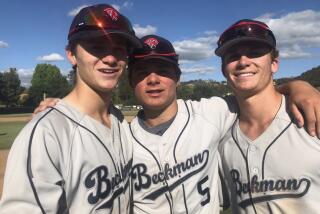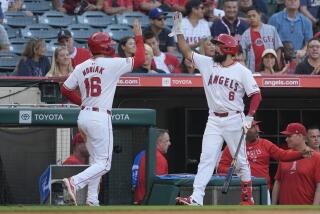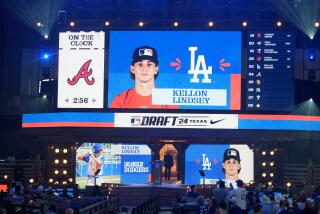Prospecting for Gold
- Share via
WESTLAKE VILLAGE — What’s all the fuss about?
That’s what Kevin Howard wants to know. The 6-foot-2, 180-pound Westlake High shortstop blissfully glides along, enjoying every last moment of his senior year.
He has a scholarship to national powerhouse Miami and will be picked by a major league team Tuesday in the amateur draft. He’ll compare the offers and decide whether to attend college or begin his professional career.
A win-win situation, just like nearly every team he’s played on.
“My choices are simple and my family and I are honest with everybody,” Howard said. “There shouldn’t be any confusion.”
So, what’s all the fuss about?
Like any top prospect, Howard has been inspected and dissected by scouts for years. But the diverse opinions swirling around him with Hurricane force are unusual, especially for a player of his ability.
A firm stance, it appears, bothers some scouts.
The Howards, with Kevin’s mother, Patricia, taking the lead, have spelled out precisely what it will take to get the Will Smith hit song “Welcome to Miami” out of their heads: Draft Kevin anywhere, but offer a signing bonus equal to that of a first-round pick.
Patricia Howard, an attorney, realizes the signing bonus is the only opportunity for her son to cash in on his amateur value. Should his demands not be met, he’ll have three years at college for the sting to subside and his value to increase until he is eligible for the draft again.
While there is no question that Howard, a left-handed hitting infielder, is a coveted pro prospect, most scouts rank him a rung below the first round, primarily because he isn’t fast.
“His bat’s going to do the talking and I think he is going to play in the big leagues,” one scout said. “But does that translate into first-round money right now?”
That’s the million-dollar question, perhaps literally. Signing bonuses for first-round picks last year ranged from $750,000 to more than $3 million.
Scouts squirm when faced with a broad range of possibilities on draft day. Which way do you go with Howard?
* Draft him in the first round or lower and cough up first-round money.
* Draft him lower than the first round, dig in your heels in negotiations and hope he lowers his demands.
* Draft him after comparable talent is long gone, even below the 10th round, offer a substantial bonus and hope he’s changed his tune.
* Ignore him.
More than one scout already predicts Howard’s end, suggesting he will be overwhelmed academically at Miami and return home within a year, reduced to playing for a junior college.
However, those who best know Howard believe otherwise.
“He’s going to excel no matter what road he takes,” said Larry Howard, Kevin’s father. “I don’t sweat it.”
Howard inherited a relaxed demeanor from his father, a mild-mannered jazz musician who is the polar opposite of the typical high-strung sports parent. But he doesn’t take a relaxed approach to improving his game.
“The perception is that everything comes easy to him, but he busts his tail,” said Nez Balelo, Howard’s private batting instructor.
Chuck Berrington, who became coach at Westlake midway through Howard’s freshman season, watched his star player mature into the leader of this season’s team that finished 19-6-1.
“He grew up a lot this year,” Berrington said. “He’s made other players better by taking a huge interest in everyone on the team. The attitude he brings to the dugout is unbelievable. He has a big-time competitive spirit.”
Howard is about as seasoned as a high school player can be. He joined the Westlake varsity as a freshman transfer from Crespi and withstood open hostility from parents of seniors who believed the precocious 14-year-old should wait his turn.
His even-keeled response to the mean-spirited comments offered the first glimpse at his uncommon composure. He excelled under pressure at a young age, leading Thousand Oaks Little League teams to a 13-year-old World Series championship in 1993 and a national title in 1995.
Howard’s sophomore year at Westlake established him as a pro prospect. Early in the season, he pulled a 92-mph fastball from eventual first-round pick Jon Garland of Kennedy down the right-field line for a double that drove in two runs. At least a dozen scouts witnessed the hit and began scribbling in their notepads.
There was no letup. Howard played third base, batted .512 and the seeds of him possessing first-round potential were sown. He spent the following summer gaining national exposure on the U.S. Junior National team.
His decision the following fall to play varsity football threw scouts for a loop, but Howard was simply displaying another side of his personality: He wanted to enjoy every aspect of high school.
He also played varsity basketball as a junior and was late joining the baseball team as a result. He slumped badly early in the 1998 season, yet rallied to bat .366 and help the Warriors advance to the Southern Section Division III final.
“I started to hear doubts because my slump lasted so long,” he said. “I was coming out of basketball and I tried a different stance, cocking my bat. By the time I switched back, it was like I’d forgotten how to hit.”
Howard straightened himself out last summer and became most valuable player in the Big League World Series. In the final against Venezuela, he drove in the winning run with two out in the seventh inning to give Conejo Valley the championship.
This season he played shortstop for the first time in high school and batted .551 with 12 home runs despite getting a steady stream of breaking pitches. And as if to show scouts baserunning is about more than speed, he had 26 stolen bases.
Most scouts project Howard as filling out his slender frame and becoming a third baseman who hits for a high average with power. His mom says to look further.
“Kevin is a lot more than how fast he runs, or whether he’s a shortstop or third baseman,” she said. “I want people to see his spirit, his work ethic and his conviction to winning.”
Yet some scouts believe mom ought to allow her son to consider signing for second- or third-round money, which ranges from $70,000 to $300,000. They recall 1993, when Jeff Suppan of Crespi, David Lamb of Newbury Park and Brad Fullmer of Montclair Prep were second-round picks. All made the big leagues.
“If he really believes he is mentally ready to play professionally now, it’s silly to turn down $500,000,” one scout said. “In three years, he could be in double-A ready to make a move to the big leagues.”
A conflicting view is offered by Miami coaches, whom Howard visited last weekend when the No. 2-ranked Hurricanes played Cal State Long Beach at Blair Field: Spend three years in our program and your value will skyrocket.
There is little doubt the charismatic Howard would revel in the social aspects of college. He also downplays concerns over his academic performance.
“I’d be willing to make sacrifices and bear down,” he said.
Raise a concern and Howard produces an easy answer.
“I’ll be happy if I sign and happy if I go to Miami,” he said. “Either way, I’m ready to play.”
More to Read
Get our high school sports newsletter
Prep Rally is devoted to the SoCal high school sports experience, bringing you scores, stories and a behind-the-scenes look at what makes prep sports so popular.
You may occasionally receive promotional content from the Los Angeles Times.







